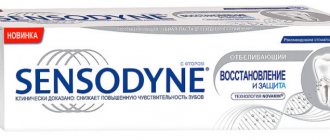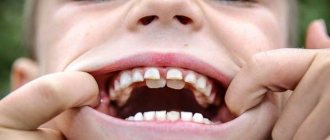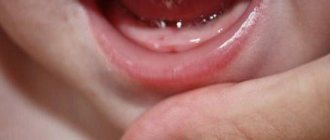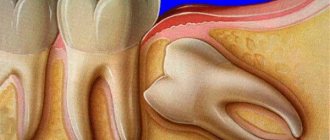Sinusitis, rhinitis and teeth
Often a cold can cause pain in all of the patient’s teeth.
Sometimes only the upper teeth or only the lower teeth hurt. Unpleasant sensations can be localized only on the right or left side. This largely depends on where in the body the infectious focus has formed. Can toothache occur from the action of infectious bacteria if the teeth are practically healthy and the patient regularly visits the dentist? Medical practice shows that people’s teeth begin to ache after an infectious lesion of the respiratory system .
Often an unpleasant symptom is caused by rhinitis and sinusitis. During the occurrence of these diseases, the lesion involves the maxillary sinuses. Under the influence of the pathogen, mucus is formed that blocks the nasal passages. This creates pressure, and if it falls on the area of the gums and teeth, their pain is guaranteed. For the same reason, teeth often hurt when you have a runny nose.
A complication may also arise in the form of the formation of purulent sacs around the tooth roots, creating pressure in the gums.
Can a tooth hurt from a runny nose?
An inflammatory process in the sinuses, accompanied by a cold, can provoke toothache. Our body is a complex system of interconnected parts. Influenza or ARVI, which mainly affects the respiratory system, contribute to the development of the inflammatory process in the paranasal sinuses. Because of it, the mucous membrane is filled with phlegm, which blocks the passages of the nasal sinuses, putting internal pressure on them, which is why teeth often hurt from a runny nose.
Why do teeth hurt when you have a cold?
This may occur as a result of some of the effects of a cold. For example, these:
- When a person develops a cold, he begins to use various means to treat it. It is very popular to drink tea with lemon. But it contains organic acid, which negatively affects the enamel. Such tea drinking may be accompanied by aching teeth, and to avoid this, you should not keep the tea in your mouth for a long time, it is better to swallow it immediately.
- During the flu or a common cold, it becomes difficult for the patient to breathe due to nasal congestion, so he breathes through his mouth. This causes its mucous membrane to dry out. As a result, sugar begins to deposit on the teeth, which leads to the destruction of enamel. It also gives pain. To prevent this from happening, it is recommended to drink plenty of fluids and prevent your mouth from drying out.
Perhaps there is unnoticed damage to the tooth, and a cold accelerates the formation of caries and the destruction of enamel.
- With the flu, intestinal disorders often occur with attacks of nausea and vomiting. At this time, the stomach produces a lot of acid. When it enters the mouth during vomiting, it damages tooth enamel. This makes all the teeth hurt. To protect them from destruction, immediately after vomiting, you should rinse your mouth well with warm water.
- Colds are always caused by hypothermia and infection. When hypothermia occurs, the body weakens and becomes vulnerable to viruses and bacteria. They penetrate the oral cavity and get into the cracks between the gums and teeth. At elevated body temperatures, their reproduction intensifies and inflammation appears. The toothache becomes very severe. In such cases, only eliminating the main focus can help.
Another cause of toothache during a cold can be cold drinking at an elevated body temperature. A sharp change in temperature in teeth can lead to cracking of enamel and even loss. And this happens with sharp pain.
Treatment methods
To get rid of a toothache, the patient must find out the cause of its formation. When determining the factors causing the disease, you should follow some recommendations.
Painful sensations in the teeth during a cold indicate an insufficient amount of vitamin C. Therefore, if the question arises, what to do if your teeth hurt from a runny nose, first of all, take care of your oral hygiene and take vitamin complexes.
Vitamin C is found in large quantities in ascorbic acid.
During treatment, avoid taking aggressive liquids, including sour and sweet drinks. In addition, the patient should not eat foods that are too cold or too hot.
We suggest you read: Can the dental nerve die on its own?
For inflammation of the trigeminal nerve, the doctor prescribes antibacterial therapy and a course of anti-inflammatory medications. At the same time, it is useful to carry out treatment with physiotherapy, in particular with electrophoresis and UHF procedures.
The most popular drug for the treatment of inflamed ternary nerve is Carbamazepine.
Improper use of traditional medicine methods can lead to increased pain.
In case of dysfunction of the joint, the patient is prohibited from using any methods of alternative medicine, heating the affected area, and is also prohibited from being in the cold for a long time.
For purulent accumulations, which have become the main cause of dental pain, therapy is aimed at the root cause.
- To begin with, the patient is prescribed daily rinsing with the following drugs: Aqualor, Aqua Maris, Humer, Marimer, No-Sol, Dolphin and others.
- After sanitizing the nasal passages, vasoconstrictor drops should be instilled into the nose - “Naphthyzin”, “Nazivin”, “Tizin”, “Otrivin” and others.
- To ensure nasal breathing and reduce the symptoms of inflammation, the doctor may prescribe combined drops - “Isofra”, “Polydex”, “Bioparox”.
- To speed up the healing process, the patient needs hormonal drugs - “Flixonase”, “Beconase”, “Nasonex”, “Nasobek” and others.
- The course of treatment includes taking antihistamines - Allergodil, Levocabastine, Kromhexal, Sanorin
- Painkillers such as Analgin, Ketanov, and Nise will help neutralize pain.
These drugs should be used for seven days. If after one week the patient does not feel better, the purulent discharge is removed surgically.
In some cases, treatment includes systemic antibiotics. However, in each case they are prescribed according to individual characteristics.
Treatment of inflammation during the formation of purulent accumulations is as follows:
- First you need to excise the affected tissue.
- Then the doctor cleans the mouth and removes all accumulated pathogenic fluid.
- After this, drainage is installed, which will reduce pain.
You can’t count on the pus sacs to resolve on their own, so take action immediately after your health worsens.
During treatment, it is important to strengthen the immune system. For this, doctors prescribe the following drugs - “Imudon”, “IRS-19”, “Ribomunil”, “Licopid”.
Until relief occurs, the patient should monitor his diet and take plenty of regular warm water.
Do not drink juices, compotes and other drinks that contain sugar.
Rinse your nasopharynx and mouth with saline solutions daily.
To reduce pain, the patient should use analgesics - “Spazmalgon”, “Analgin”, “No-shpa”. Painkiller tablets are best taken at night.
If you experience pain in your teeth due to a cold, you can use compresses based on Lidocaine. If you don’t have the drug on hand, use lotions. To do this, apply a cold object to the tooth for a few minutes. After this, a tampon soaked in valerian or calendula tincture should be inserted into the affected area.
Trigeminal nerve
A common cause of tooth pain is inflammation of the facial nerve as a result of colds and infections. When this happens, the patient's entire cold side of the face hurts, along with the jaw and teeth.
The face becomes distorted, there is no facial expression on one side, while the other side remains unchanged. The pain is very severe and does not go away without pain relief.
Pain in the jaw due to ARVI
Inflammation of the trigeminal nerve
Toothache during a cold can be a consequence of inflammation of the trigeminal nerve (see also: what to do if the dental nerve has caught a cold?). This disease develops due to a viral infection and inflammation in the jaw joint. The infection that penetrates the nerve and plexus of blood vessels quickly spreads and sometimes makes the whole face hurt.
The patient feels that his jaw is aching and his teeth hurt on the side where the inflammation develops (we recommend reading: which doctor to see and what to do if your jaw hurts?). The disease is accompanied by slightly noticeable swelling of the face, and when trying to yawn or swallow food, the person feels severe discomfort.
What to do to reduce pain? It is worth remembering that you cannot self-medicate. Using a heating pad at home is strictly prohibited - improper heating of soft tissues can aggravate the inflammatory process and pain. In addition, discomfort in the cheekbones and teeth can be caused by otitis media or inflammation of the articular sac of the lower jaw, and not the nerve. In these cases, diagnosis and treatment is carried out by an ENT specialist, not a neurologist.
If there is an inflammatory process in the trigeminal nerve, the specialist will prescribe anti-inflammatory drugs and antibiotics. One of the commonly used drugs for this diagnosis is Carbamazepine. Physiotherapy is also used for treatment: electrophoresis, ultrasound and magnetic therapy.
How to treat teeth for a cold
This pain can occur when talking, coughing, eating or drinking, or simply when breathing in cold air. It often happens that the upper jaw hurts even with a slight runny nose. The following methods are used to treat toothache:
- medicinal;
- physiotherapy;
- ethnoscience.
Let's look at each of the methods in more detail.
Drug treatment
Modern medicine offers many medications that can relieve raging tooth pain.
But they have various contraindications, so you should not take them without consulting a dentist. You should go to the doctor immediately as soon as pain in your teeth appears. The dentist will conduct an examination and tell you what actions to take. Perhaps the pain arose as a result of increased sensitivity of the teeth and to prevent them from hurting, it is enough to brush them with a special paste.
But if the pain occurs as a result of an infectious process in the respiratory system, then the underlying disease should be treated. Anesthesia is used for the teeth, and surgical measures are required to relieve pressure in the maxillary sinuses. Antibiotics are prescribed to suppress the infection.
To temporarily relieve pain, you can hold an Analgin or Nosh-pa tablet in your mouth before going to the doctor. But you shouldn’t get carried away, they relieve pain temporarily, and constant use can lead to an overdose.
Physiotherapy
In order to relieve pain and inflammation in the dental area, magnetic therapy, electrophoresis and UHF are prescribed. To carry them out, a magnetic field, ultra-high frequencies and constant electric current are used. With their help, heat is generated in the affected area and the medicine is delivered to the inflammatory focus. This allows you to achieve better results from treatment.
ethnoscience
It is necessary to treat not only tooth pain, but also the underlying disease. If you relieve pain, forgetting about its causes, you can be left without teeth. Here are some useful recipes that you can use if your teeth are hurting:
- The simplest and most effective way to eliminate pain is to rinse your mouth with baking soda. Dissolve 1 tsp. soda in a glass of warm water and rinse your mouth. Baking soda alkalizes the oral cavity and relieves inflammation.
- Rinsing a decoction with sage helps a lot. It soothes pain and kills infection. The herb is brewed with boiling water, infused and rinsed in the mouth.
- You can hold an infusion of chamomile or calendula in your mouth - these medicinal herbs also fight infection well.
- Cranberry juice has a good effect. Its use clears the mouth of bacteria that cause tooth decay.
All these recipes will help if the toothache is local. If the cause is purulent pressure in the gums or a cold nerve, there will be no benefit from such measures . In these cases, heat on the nerve and cold on the purulent focus will help better. In no case is it the other way around! And immediately see a doctor.
Teeth are the only part of the human body that does not have the ability to repair itself.
You need to understand that with a cold, toothache is a complication of the underlying disease, and not an independent disease. And we must fight, first of all, this pathology. Perhaps when it goes away, the problems in your mouth will also go away.
Massage for gum inflammation
It is performed using special preventive pastes, using a brush with soft bristles or cotton pads soaked in decoctions of medicinal plants.
This procedure will be most effective in treating gum inflammation during pregnancy, it is absolutely safe and effective. The massage should begin from the center and up to the wisdom tooth; movements should be light and smooth, they should not cause pain.
This is one of the excellent methods for preventing inflammatory processes of the gums. A positive result will be visible after systematically performing a full course of procedures, at least 10 during the entire treatment period.
You need to do a massage in the morning and evening, one session should last at least 5 minutes. Afterwards, you can rinse your mouth with tincture of ginseng or radish. The main thing is not to cause additional irritation to the gum area.








